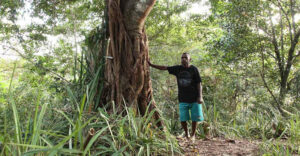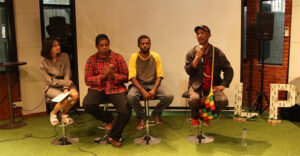
Community plays its significant role in environmental change agenda. They are the catalysators or driver of change towards equal and sustainable natural resources management. Without community participation, environmental change agenda such as global warming mitigation or food resilience will run partially.
“Sometimes, solution comes from the community. When they tell a tale, intuitively it will come with a way out of what to do, despite the obstacle of here and there,” said Nur Hidayati, the Executive Director of the Indonesian Forum for the Environment (Walhi), in a talk show with participants of intermediate class of School of Eco Diplomacy on Friday 23 October 2020.
The talk show was part of the series of the EcoNusa’s intermediate class of School of Eco Diplomacy (SED) that has started from 17 October to 27 November 2020. Thirty participants across Indonesia were selected to join the capacity building program on environmental leadership for Indonesian young generation. These shortlisted young peoples are expectedly to create actions to conserve environment with concrete contribution to save environment in Indonesia, particularly the eastern regions.
On the talk show, Nur said that environmental advocacy will run effectively if it fits the needs of the community. Green activists or youth organization that pay a visit to a community should not have acted as a liberator. She said that anyone engaging with the community should have played their roles as a pupil who pays a visit to his/her teacher.
In her presentation, Nur also blamed the government for its flaw in identifying problems among the community. As to her, the government often comes in formal manner. This way makes the community uncommunicative. Consequently, information digging in search of root of the problem and solution is just a formal and ceremonial process.
“The major key (to engage with a community) to assist the community is by listening. If we want to offer help, we should identify first what really is going on. Do not act like a teacher who comes and delivers a speech. Please come as a pupil who knows nothing. We should be ready to learn from the community,” Nur said.
Secretary General for the Coalition for the Fisheries Justice Indonesia (KIARA) Susan Herawati said that there are no standard rules to provide assistance to the community and advocate environmental change. As to her, each community has different approach and perspective towards a problem.
KIARA uses personal approach during its advocacy on fisherman gender issue that has not been well accommodated in the regulations. Women fisherman have important roles in fisheries production chain and economic activity of fisherman family. But on the other hand, they do not get equal protection as male fishermen do.
“We do not use jargon during our talk with the community. It does not mean that the community is not smart. All people have their own intelligence. First of all, we just sit with them or go the sea. We do not say that we have to talk about gender equality,” said Susan.
Indonesian Young Foresters (RMI) Executive Director Mardha Tillah said that advocacy for environment could not be done alone. A collaboration is the key to garner supports to change something into positive to the public. The absence of collaboration will only shorten the breath of advocacy.
“Building a network, getting acquaintance with many peoples will give a long breath for advocacy which sometimes goes ups and downs. But we should have networks to lend a hand to each other. It is a long journey to go,” said Mardha.
Editor: V.A Wulandani & Leo Wahyudi




